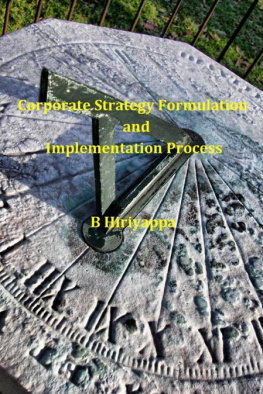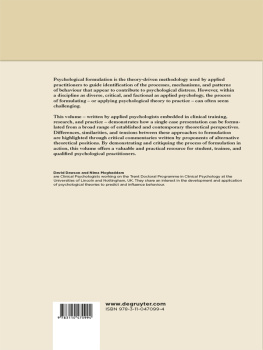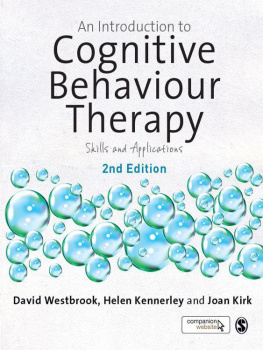Case Formulation in Cognitive Behaviour Therapy
Since the successful first edition of Case Formulation in Cognitive Behaviour Therapy, there has been a proliferation of psychological research supporting the effectiveness of CBT for a range of disorders. Case formulation is the starting point for CBT treatment, and Case Formulation in Cognitive Behaviour Therapy is unique in both its focus upon formulation, and the scope and range of ideas and disorders it covers. With a range of expert contributions, this substantially updated second edition of the book includes chapters addressing the evidence base and rationale for using a formulation-driven approach in CBT; disorder-specific formulation models; the formulation process amongst populations with varying needs; formulation in supervision and with staff groups. New to the book are chapters that discuss:
- Formulation amongst populations with physical health difficulties
- Formulation approaches to suicidal behaviour
- Formulation with staff groups
Case Formulation in Cognitive Behaviour Therapy will be an indispensable guide for experienced therapists and clinical psychologists and counsellors seeking to continue their professional development and aiming to update their knowledge with the latest developments in CBT formulation.
Nicholas Tarrier has held academic appointments in Brazil and Australia and worked as a clinical psychologist in the NHS. From 1991 to 2011 he was Professor of Clinical Psychology at the University of Manchester and at the Institute of Psychiatry, Kings College London from 2011 to 2014. His main research interests have been in investigating psychosocial environments in the development of mental disorders and the development and evaluation of cognitive-behavioural and family interventions. He is now retired.
Judith Johnson is a Clinical Psychologist and Lecturer at the University of Leeds and the Bradford Institute of Health Research. Her research is focused upon understanding and supporting the development of wellbeing and resilience, and how this can be applied in healthcare settings to improve interventions and service delivery.
Cognitive behavior therapists are scientist practitioners whose work is informed by advances in theory and research, and guided by an understanding of the unique problems and circumstances of each person they treat. Case formulation is a powerful tool for systematically identifying critical factors leading to and maintaining maladaptive functioning, and then developing, evaluating, and modifying treatment plans until the desired goals have been achieved. This second edition of Case Formulation in CBT is a treasure trove for any practicing clinician. The book includes useful introductory material on contemporary approaches to case formulation, specific chapters delving into a broad range of behavioral health problems replete with case examples, applications in non-clinical populations (such as carers and asylum seekers), and supervision. This book fills a critical gap in the need for clinicians to stay abreast with the latest advances in developing state-of-the-art case formulations essential to effective clinical practice.
Kim T. Mueser, PhD, Executive Director, Center for Psychiatric Rehabilitation, Professor of Occupational Therapy, Psychology and Psychiatry, Boston University
This authoritative edited book places the individual client squarely front and centre in formulating that persons mental health problems and consequently in planning appropriate treatment. It presents a clear and superior alternative to the simple dissemination of treatments in the absence of formulation of the individuals problems. I highly recommend this important book to all mental health practitioners.
Henry Jackson, Emeritus Professor of Clinical Psychology, University of Melbourne, Australia
Treatment tailoring has entered our vocabulary relatively recently and we have endorsed it but without the evidence base. This book fills this space and provides an understanding of why personalisation is vital not just for successful treatment but because it is valued by the individuals who use mental health services. Case formulation is one way of building the therapeutic collaboration essential for any therapy and also makes the therapeutic targets more focussed for both the therapist and the client. This book provides a step by step guide and evidence for benefits of specific techniques across disorders giving both clinicians and academics access to valuable information all in one place.
Til Wykes, Vice Dean Psychology and System Sciences, Professor of Clinical Psychology and Rehabilitation, Co-Director Service User Research Enterprise, Institute of Psychiatry, Kings College London, UK
Excellence in clinical practice requires in equal parts attention to nomothetic issues, or how the individual patient resembles others generally in such broad areas as diagnostic categories or treatment response, and idiographic issues, or what is unique about the individual patient. In this age of treatment manuals it is this latter area that is most often neglected, and yet it is crucially important since clinicians see individuals and not large groups in most settings. In this excellent book, now in its second edition, idiographic case formulation is highlighted by expert clinicians from the UK and the USA. Clinical training and clinical practice cannot be complete without this perspective and all clinicians should be familiar with this excellent resource.
David H. Barlow, PhD, ABPP, Professor of Psychology and Psychiatry, Boston University, Founder and Director Emeritus, Center for Anxiety and Related Disorders, Boston, USA
Case Formulation in Cognitive Behaviour Therapy
The treatment of challenging and complex cases
Second Edition
Edited by Nicholas Tarrier and Judith Johnson

Second edition published 2016
by Routledge
27 Church Road, Hove, East Sussex, BN3 2FA
And by Routledge
711 Third Avenue, New York, NY 10017
Routledge is an imprint of the Taylor & Francis Group, an informa business
2016 Nicholas Tarrier and Judith Johnson
The right of Nicholas Tarrier and Judith Johnson to be identified as the authors of the editorial material, and of the authors for their individual chapters, has been asserted in accordance with sections 77 and 78 of the Copyright, Designs and Patents Act 1988.
All rights reserved. No part of this book may be reprinted or reproduced or utilised in any form or by any electronic, mechanical, or other means, now known or hereafter invented, including photocopying and recording, or in any information storage or retrieval system, without permission in writing from the publishers.
Trademark notice: Product or corporate names may be trademarks or registered trademarks, and are used only for identification and explanation without intent to infringe.
First edition published by Routledge 2006
British Library Cataloguing-in-Publication Data
A catalogue record for this book is available from the British Library
Library of Congress Cataloging-in-Publication Data
Case formulation in cognitive behaviour therapy : the treatment of challenging and complex cases / edited by Nicholas Tarrier and Judith Johnson. Second edition.
pages cm
1.Cognitive therapy.2.Cognitive therapyCase studies.I.Tarrier, Nicholas.II.Johnson, Judith, 1955
RC489.C63.C33 2015
616.89'1425dc23
2015004173
ISBN: 978-0-415-74178-1 (hbk)
ISBN: 978-0-415-74179-8 (pbk)
ISBN: 978-1-315-69419-1 (ebk)












